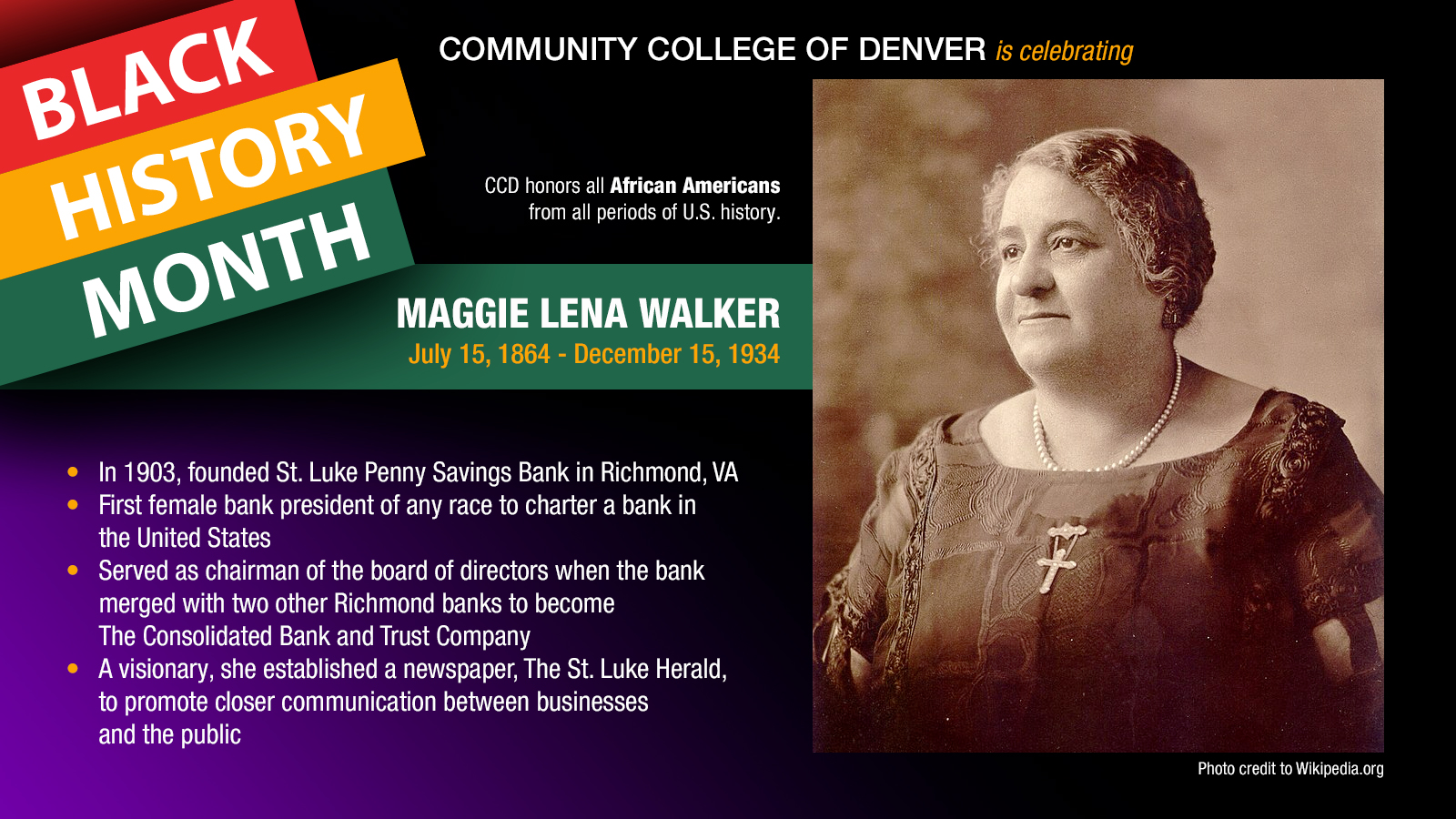

Hello, CityHawks! February marks Black History Month, and during this time, we are paying tribute to both historical and contemporary Black trailblazers. This week, we delved into the stories of...
“Let woman choose her own vocation just as man does his. Let her go into business, let her make money, let her become independent, if possible, of man.” -Maggie Lena Walker
Maggie Lena Walker was a businesswoman, teacher, civil rights activist, and the daughter of a former slave. Walker became the first woman of any race to charter a bank in the U.S., opening St. Luke Penny Savings Bank in Richmond, VA, in 1903. When the bank and two others merged, she remained as part of the board of directors. Furthermore, before St. Luke Penny Savings Bank, Maggie Lena Walker founded St. Luke Harold newspaper in 1902 to promote closer communication between businesses and the public.
“American history is longer, larger, more various, more beautiful, and more terrible than anything anyone has ever said about it.” -James Baldwin
James Baldwin was a writer and civil rights activist born in New York City. His essays, novels, poems, and plays had a strong emphasis on the intricacies of racial, sexuality, and class distinctions in Western society during the mid-20th century. As a journalist, Baldwin covered major civil rights events, including the 1963 March on Washington and 1965 Selma to Montgomery March. His published essay, The Fire Next Time, predicted the outbursts of black anger to come.
One in four of America’s cowboys were African American. Many slaves during the 17th and 18th centuries were familiar with herding cattle from their homelands of West Africa. The Federation of Black Cowboys maintained the legacies of Black cowboys in America, even though Hollywood’s dismissive attitude toward those who made history shined very little light on them.
The child of slave parents and born into slavery himself, Bass Reeves went on to become the first African American deputy U.S. marshal west of the Mississippi River. He had an interesting life leading up to that, fighting alongside Union soldiers during the Civil War as a slave before escaping to indigenous territory.
Ned Hudstleston, also known as Isom Dart, was a slave freed after the Civil War. He built up a reputation as an outlaw in the Wyoming territory in the late 19th century. He later began stealing horses and cattle in Mexico and herding them to Texas. Hudstleston later settled in Routt County, the county in which Steamboat Springs is located.
William “Bill” Pickett was an African American cowboy and rodeo performer born in Texas. Considered to be the originator of bulldogging, grabbing cattle by the horns, and wrestling them to the ground, he became somewhat of a celebrity. Along with four of his 13 siblings, Pickett created The Pickett Brother Bronco Busters and Rough Riders Association. He was also cast in multiple films in the 1920s.
“What we must do is commit ourselves to some future that can include each other and to work toward that future with the particular strengths of our individual identities. And in order for us to do this, we must allow each other our differences at the same time as we recognize our sameness.” -Audre Lorde
Audre Lorde was a writer (most notably known for her poetry), intersectional feminist, civil rights activist, and professor. She worked as a librarian both during her undergrad years at Hunter College and postgrad at Columbia University. Lorde’s literary pieces are focused around racism, her antiwar stance, sexuality, and feminism.
“Presumption should never make us neglect that which appears easy to us, nor despair make us lose courage at the sight of difficulties.” – Benjamin Banneker
Benjamin Banneker was a naturalist, mathematician, astronomer, farmer, and almanac author. Born and raised in Maryland, he created an irrigation system to water crops. Banneker also invented the first wooden clock in America in the 1750s. He was later hired to survey territory for what was to become our nation’s capital, Washington, D.C. Banneker often corresponded with Thomas Jefferson, becoming an early civil rights activist.
“If you can be the best, then why not try to be the best?” -Garrett A. Morgan, SR.
Garrett A. Morgan, SR., born in Kentucky and living his adult life in Ohio, was American inventor, businessman, and community leader. He is most notably famous for inventing the three-way traffic light, protective ‘smoke hood’ used in the 1916 Waterworks Tunnel construction disaster, as well as a chemical hair straightening solution. He acquired patents for the traffic light in three different countries. Garrett A. Morgan, SR. now has several schools, a street, and a water plant named after him in three states.
“Freedom has never been free.” -Medgar Evers
Medgar Evers was a pioneering civil rights leader and WWII veteran. Evers served as the NAACP’s first field secretary in Mississippi, organizing protests and voter registration drives. After being rejected, or rather denied, from the University of Mississippi’s law school, Evers took it upon himself to fight for racial equality in higher education. Eight years later, the first African American, James Meredith, was accepted. Evers was murdered in 1963 by a white nationalist upon his arrival home to his wife and children.
S. Kato Crews, a Pueblo native, currently serves as a U.S. district judge for the United States District Court of Colorado as of January 12, 2024. He received his undergraduate degree from the University of Northern Colorado and went on to complete his Juris Doctor degree at the University of Arizona. Crews worked practiced law for many years, focusing on labor and employment law and civil litigation. In 2018, he became the first African American magistrate judge of the U.S. District Court for the District of Colorado.